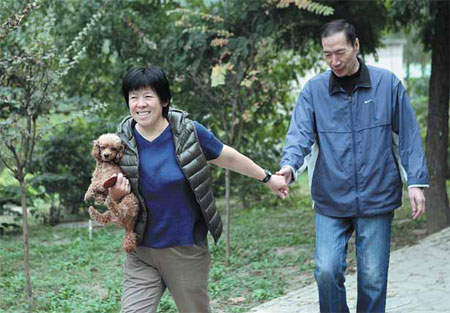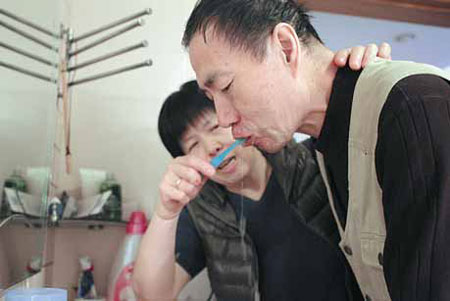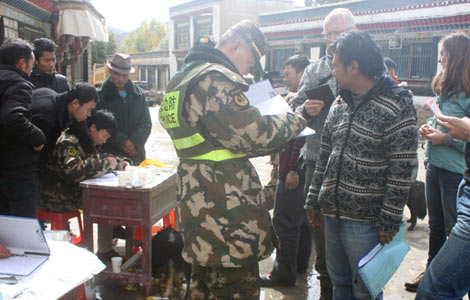At a loss
Updated: 2013-10-16 07:07
By Liu Zhihua (China Daily USA)
|
||||||||
Families of dementia patients struggle to cope with the heartbreak as their loved ones slowly disconnect with reality. Institutions as well as caregivers are overwhelmed by the disability, Liu Zhihua reports.
For Beijing resident Cao Guirong, 56, life is like being in prison, hopeless.
Since 2005, when her 59-year-old husband began to suffer from dementia before a diagnosis of Alzheimer's disease, she has been watching him lose memory and the ability to take care of daily activities day after day, with no way to stop the progress.
"He has lost his intelligence, and needs care 24 hours a day," says Cao, who retired five years ago to take care of her husband.
Dementia, usually associated with old age and from conditions such as Alzheimer's, is a progressive brain disorder that makes it increasingly difficult to remember things, think clearly and communicate with others. That combination makes it virtually impossible for them to live without a caregiver, and the progress is irreversible.
China is estimated to have 9.19 million people suffering from the disorder, more than any other country, according to a study published in June in the British medical journal The Lancet.
"Dementia is devastating to patients' lives, and poses bitter challenges to their families and caregivers," says Wang Huali, deputy director of Dementia Care and Research Center with Peking University Institute of Mental Health.
But for Chinese families, life is particularly hard, due to scarcity of treatment and nursing facilities.
China has only 61 geriatric hospitals and less than 300 rehabilitation centers for its approximately 200 million senior people, including 16 million who have completely lost the ability to function in daily life, according to Wu Yushao, vice-president of the China National Committee on Aging.
Even worse, few hospitals have expertise in dementia, and many rehabilitation centers and nursing houses refuse to take in such patients.
"The burden is all on family members," says Cao Guirong, the caregiver. "There is no quality of life for me."
Every day, she needs to cleanse and dress her husband, feed him, make him exercise, and barely leaves him alone, for fear that he will get hurt.
Because he can easily go missing or trouble others because of incontinence, she doesn't dare to take him outdoors except when it's necessary - to exercise on a playground downstairs, or to go to the hospital, for example.
Hiring a helper is impossible, because few housemaids are willing to take care of someone with dementia.
Nursing homes are also out of the question, because the family often doesn't trust caregivers they can't supervise, especially when the patient cannot speak out if he is mistreated. In addition, most can't afford such care.
Cao can only get a short break on weekends when her son is not busy with work and comes to help.
"Only caregivers of dementia patients know how hard it is," says Zi Nuo, 52, in Zhuhai, Guangdong province, whose 79-year-old mother suffers from vascular dementia caused by diminished blood supply to the brain.
"People with dementia forget what they've done or said very quickly. You never know what they will do the next minute, and they need to be guarded 24 hours a day."
Her mother was diagnosed in 2010 at a mid-stage, and the condition has deteriorated quickly. She now cannot remember anyone, including herself. She is moody, and sometimes even violent.

She wakes up frequently and yells during the night, a common symptom in severe cases, and suffers from incontinence, often in the middle of the night.
Twice, the afflicted woman has damaged the door lock, and left the apartment alone. Now Zi has installed a specially designed door lock.
The physical and mental exhaustion have caused depression and high blood pressure for Zi.
However, Zi feels lucky that she is young enough to endure the physical and psychological pressure for her mother's sake, because many caregivers she knows are the seniors' spouses.
A 76-year-old Beijing resident, who asked to be identified as Peng, has been taking care of her 75-year-old husband with dementia for a decade. Their children don't live with them.
Diagnosed in 2004, her husband now has lost almost all abilities, except to walk when dragged. Peng has developed severe high blood pressure, heart disease and depression.
She refuses suggestions to send her husband to a nursing home, saying those facilities lack professional and devoted care.
Since 2009, she has been able to get a housemaid willing to help, for 4,000 yuan a month ($654). Sometimes, she is able to enjoy short travels.
Not everyone is as lucky.
Beijing resident Cao says if her son is away, she doesn't dare go to hospitals even if she's sick.
Zi, who looks after the mother in Zhuhai alone because her daughter and brother live in other cities far away, says although there is a supermarket in her community, she buys most things online.
"We are tied to the patients," Cao says. "I just hope there will be someone who can help, and let me get a break, even if only for a while."
Contact the writer at liuzhihua@chinadaily.com.cn.
|
Cao Guirong and her husband, who has suffered from dementia since 2005, enjoy the pleasure of a rare moment outdoors near their home in Beijing. Photos by Zou Hong / China Daily |
|
Dementia patients need care 24 hours a day, which is a great burden for their families. |
(China Daily USA 10/16/2013 page9)
Most Viewed
Editor's Picks

|

|

|

|

|

|
Today's Top News
Mexico demands US response over spying scandal
Breast cancer on the rise
Hong Kong, AmEx host culinary feast
Yao, NBA to open training school for teens
IMAX: China exceeds CEO's expectations
Last-ditch effort on debt ceiling
China-UK cooperation projects inked
Alcoa CEO to be feted by US-China Committee
US Weekly

|

|
















